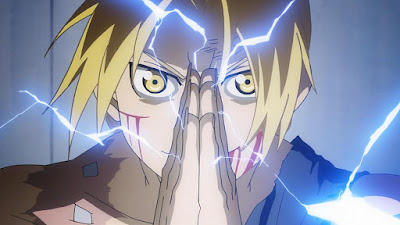I have a fascination for the clash of extremes.
Good and evil, corruption and purity, order and chaos, impulse and restraint. Light and Shadow, Ice and Fire, Paragon and Renegade, Jedi and Sith. You may have noticed.
-points to profile-
But maybe I should explain that further. People tend to view these things in terms of one triumphing over the other. Good prevailing, evil dominating. That's only natural. But what happens after one wins?
The light never dies. The darkness always comes back.
The battle never truly ends.
I'm reminded of the ending of the Wheel of Time - and yes, I will get around to that final post eventually.
The Last Battle was more philosophical than most people expected. Amidst the war being fought around them, Rand and the Dark One fought using worldviews contemplating the nature of evil. Though Rand had long believed he could somehow kill the Dark One, he was forced to concede it couldn't be done. Darkness cannot be destroyed, only defeated.
Because stripping the evil from someone robs them of the desire to be good. And are you truly good if you have no other choice?
Light is defined by shadow, and vice versa.
So when I say I'm interested in opposing forces - they interest me when taken together.
Though religion says otherwise, sometimes I doubt absolute good and evil really exist. Isn't everyone a blend of both? A mix of conflicting forces?
Maybe that ending sounded bleak. But it's presented as an epiphany. Rand at last understands that 'the Dark One was not the enemy. It never had been.' I didn't understand that for a long time. When I finally learned what it meant, like so many other things in this series - it blew my mind.
The Dark One is the personification of evil, to be sure. It exists. But the ones doing evil, plotting and killing and creating monsters, not to mention freeing the Dark One in the first place, were men and women.
In many ways, Rand's story is a descent into darkness. He grows increasingly angry at the world he's meant to save; bitter about his prophesized death; and unfeeling, convinced that compassion is a weakness. Eventually he sees the light and becomes a true saviour, gaining hope and wisdom amidst his sorrow. But he almost became the very thing he fought against.
Rand's true foe was never the Dark One. It was Rand himself.
You see? Conflicting forces.
A few weeks back, I read a quote that's stuck with me ever since. I like quotes. They're bite-sized portions of wisdom, proof of the power of writing to show you the world in a different way.
Mileage may vary, of course. This particular bite is something everyone's aware of on some level. But I'd never thought of it quite like this.1
You see? Conflicting forces.
A few weeks back, I read a quote that's stuck with me ever since. I like quotes. They're bite-sized portions of wisdom, proof of the power of writing to show you the world in a different way.
Mileage may vary, of course. This particular bite is something everyone's aware of on some level. But I'd never thought of it quite like this.1
Everyone has issues. In real life, there are no two-dimensional characters. We are all the heroes or heroines of our own stories, and each and every one of us is flawed. Our behaviour is both nurture and nature; our basic personality augmented by the lessons we've learned, the ghosts that haunt us, and the problems we deal with every day.
Like that song I mentioned a few weeks ago. Remember?
Everybody's got their demons.
And you can never truly know the depths of another's darkness. Even the people closest to you can be a mystery.
Maybe it's loneliness. Ageing. Fear of failure. Trauma. A toxic relationship. A life unlived. An unfulfilling job. Financial difficulty. Sickness or infirmity. An inability to do things most people take for granted. Pain, depression, above all regret. The things you wish you'd done, or hadn't done, or had done differently. The list goes on and on. And it makes me wonder, how well do we truly know anyone?
I suspect my battle would surprise you. No doubt yours would surprise me.
Which makes it even more important that we try to understand each other.
It's easy to judge someone's behaviour or beliefs based on what you think you know. But you haven't been where they've been, done what they've done, lived through what was done to them. Any more than they understand those things about you. Make an effort and you might just gain a new perspective.2
Choose to be kind. Be a light in someone else's darkness.
Isn't that what being good is all about?
1 - Written by a bestselling YA author I'd never heard of. I should try one of her books.
2 - The backstory of FMA: Brotherhood involves the mostly white military slaughtering a dark-skinned uprising. Against this backdrop of racism and ethnic cleansing, a white general names a mixed-blood officer as her second-in-command. He demands to know why. She answers that she needs someone whose perspective differs from her own. It's one of my favorite scenes.













